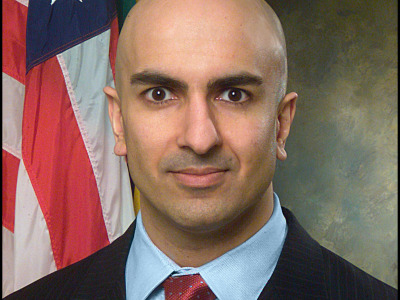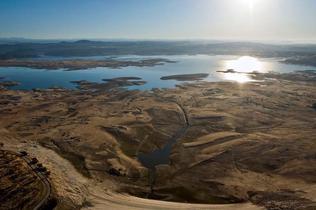Jerry Brown
Kashkari’s Unworkable Environmental Review “Reform” Plan
Net zero buildings for everyone?
In last night’s California gubernatorial debate, Republican candidate Neel Kashkari proposed a major reform to the California Environmental Quality Act (CEQA), which requires environmental review of new projects. But rather than gutting CEQA completely, a la State-Senator-turned-Chevron-lobbyist Michael Rubio, Kashkari proposed to give all projects the same breaks that the Sacramento Kings received in last …
Continue reading “Kashkari’s Unworkable Environmental Review “Reform” Plan”
CONTINUE READINGCalifornia Headed for Record Drought: Will Critically-Needed Reforms Follow?
Confronting a Looming Environmental Disaster
The Sacramento Bee’s fine environmental reporter, Matt Weiser, yesterday reported on a looming, major drought facing California and its regional neighbors. The figures aren’t pretty. A persistent high-pressure front stretching over the Gulf of Alaska and most of the Northern Pacific has diverted the normal fall and winter storm track away from California and other …
Continue reading “California Headed for Record Drought: Will Critically-Needed Reforms Follow?”
CONTINUE READINGCalfiornia Bans Lead Ammunition
New Law Is Welcome, But Probably Won’t Take Full Effect Until 2019
California Governor Jerry Brown has signed legislation that will ban the use of lead ammunition in California by hunters. In approving AB 711 (Rendon), Brown withstood furious lobbying efforts by the National Rifle Association and some (but not all) hunting organizations, who had urged the Governor to veto the legislation. AB 711 was supported by …
Continue reading “Calfiornia Bans Lead Ammunition”
CONTINUE READINGGetting Permission to Go Solar
Last summer, Berkeley’s Center for Law, Energy and the Environment (CLEE) issued a report, at the request of Governor Jerry Brown, identifying barriers to the accelerated deployment of “distributed” renewable energy projects. This document was the result of a stakeholder conference hosted by the Governor, located on campus at UCLA, and substantively managed by Berkeley …
Continue reading “Getting Permission to Go Solar”
CONTINUE READINGGuest Blogger Ken Alex: Saving Electricity for a Rainy Day
Ken Alex is a Senior Advisor to Governor Jerry Brown and the Director of the Governor’s Office of Planning and Research. The views expressed in this blog post are his own. We are making progress in two more key areas, although California, for now, is not in the lead. Thanks to new developments and a …
Continue reading “Guest Blogger Ken Alex: Saving Electricity for a Rainy Day”
CONTINUE READINGCalifornia’s Proposition 30 and the Environment
With so much attention paid to the presidential race, it’s easy to overlook the fact that California’s fiscal future is on the ballot tomorrow, with consequences for the environment. Proposition 30 represents Governor Jerry Brown’s attempt to stave off harsh cuts to the state budget, a situation brought on by declining tax revenues in the …
Continue reading “California’s Proposition 30 and the Environment”
CONTINUE READINGWhy Did Mono Lake Become a Cause Celebre?
Why did saving Mono Lake become such a potent political issue during the late 1970’s and early 1980’s? For a book I am currently writing on the case, that is a critical question. After all, hundreds of groups — hundreds of environmental groups — seek media oxygen for their cases all the time. Both nationwide …
Continue reading “Why Did Mono Lake Become a Cause Celebre?”
CONTINUE READINGA New Report on the Governor’s Local Renewable Energy Initiative
Last July, I reported on a conference convened at UCLA by California Governor Jerry Brown to further his efforts to increase the amount of local renewable electric generation in California to 12,000 megawatts of installed capacity by the year 2020. Berkeley Law’s Center for Law, Energy and the Environment provided the substantive support for that event, …
Continue reading “A New Report on the Governor’s Local Renewable Energy Initiative”
CONTINUE READINGStopping High Speed Sprawl
California Governor Jerry Brown has doubled down on his support for the state’s proposed high speed rail system, despite the uncertainty about how to pay for it and growing public opposition. But who can blame him? If the rail system does get built, it will be the defining infrastructure project in the state for generations …
Continue reading “Stopping High Speed Sprawl”
CONTINUE READINGExploring Policies to Promote Local Renewables
Last July, California Governor Jerry Brown held a conference, hosted by the Luskin Center at UCLA, to launch his initiative to achieve 12,000 megawatts of local renewable energy projects in California by 2020. Local renewables, often called distributed generation, are projects no larger than 20 megawatts located close to customer demand. Berkeley Law’s Center for …
Continue reading “Exploring Policies to Promote Local Renewables”
CONTINUE READING





